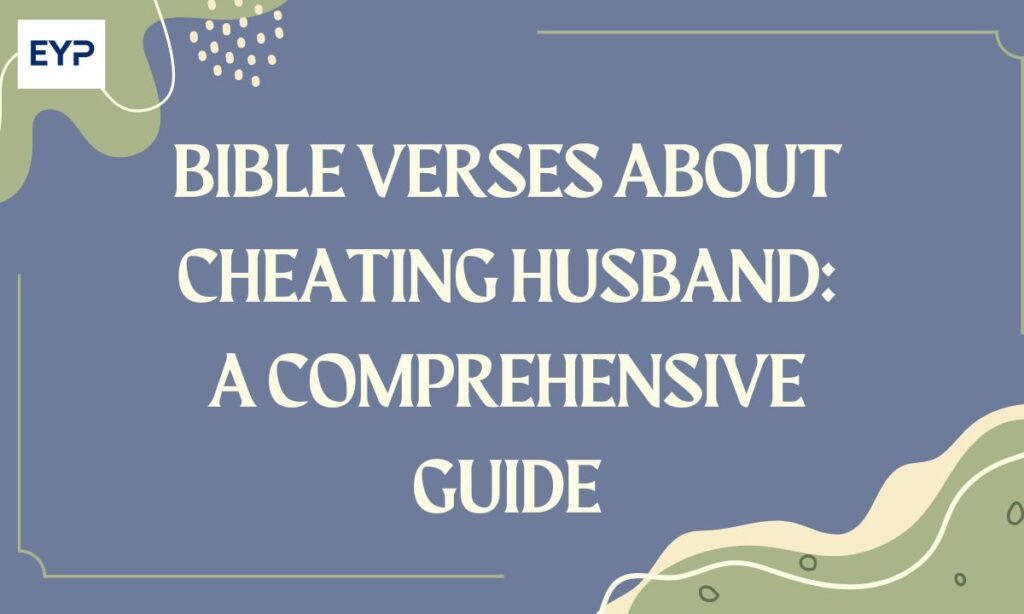When the sacred bond of marriage is broken by infidelity, the pain can feel overwhelming and all-consuming. The discovery of a cheating spouse creates a whirlwind of emotions—betrayal, anger, confusion, and profound sadness. In these darkest moments, many turn to Scripture for comfort, guidance, and hope.
The Bible, with its timeless wisdom and divine insight, offers a comprehensive framework for understanding and navigating the complex emotions and decisions that arise from marital infidelity.
Verses on Faithfulness in Marriage
Proverbs 6:32 serves as a stark warning about the nature of adultery: “But a man who commits adultery lacks sense; he who does it destroys himself.” This verse reveals the self-destructive nature of infidelity.
The Hebrew word for “lacks sense” suggests someone who is devoid of understanding or wisdom. Adultery is not merely a mistake or momentary lapse in judgment—it represents a fundamental lack of wisdom that ultimately brings destruction upon the one who commits it.
Hebrews 13:4 establishes the divine standard for marriage: “Let marriage be held in honor among all, and let the marriage bed be undefiled, for God will judge the sexually immoral and adulterous.”
This New Testament verse emphasizes that marriage is to be honored by everyone—not just married couples, but by society as a whole. The phrase “marriage bed be undefiled” refers to the exclusive sexual relationship between husband and wife, which should remain pure and sacred.
Matthew 19:6 presents Jesus’s profound teaching on marital unity: “So they are no longer two but one flesh. What therefore God has joined together, let not man separate.”
This verse reveals the mysterious and sacred nature of marriage—it creates a union so complete that two individuals become one entity in God’s eyes. When Jesus says “what God has joined together,” He emphasizes that marriage is not merely a human contract but a divine institution.
1 Corinthians 6:18 provides urgent instruction about sexual purity: “Flee from sexual immorality.
Every other sin a person commits is outside the body, but the sexually immoral person sins against his own body.” The word “flee” suggests immediate and urgent escape, like running from physical danger.
Exodus 20:14 presents the seventh commandment in its simple yet profound clarity: “You shall not commit adultery.”
This commandment, given directly by God to Moses, establishes adultery as a violation of divine law. The brevity of the command emphasizes its universal and absolute nature—there are no exceptions or qualifications.
Proverbs 5:18-19 offers positive instruction for maintaining faithfulness: “Let your fountain be blessed, and rejoice in the wife of your youth, a lovely deer, a graceful doe. Let her breasts fill you at all times with delight; be intoxicated always in her love.”
These verses use beautiful imagery to encourage husbands to find complete satisfaction and joy in their wives. The metaphor of being “intoxicated” with one’s wife’s love suggests a consuming satisfaction that leaves no room for seeking fulfillment elsewhere.
Malachi 2:16 reveals God’s heart toward unfaithfulness: “For the man who does not love his wife but divorces her,” says the Lord, the God of Israel, “covers his garment with violence,” says the Lord of hosts. “So guard yourselves in your spirit, and do not be faithless.”
This verse uses the metaphor of covering one’s garment with violence to describe the destructive nature of unfaithfulness. The command to “guard yourselves in your spirit” emphasizes that faithfulness begins in the heart and mind—it requires intentional vigilance and protection of one’s inner life.
Ephesians 5:25 sets the standard for husbands: “Husbands, love your wives, as Christ loved the church and gave himself up for her.” This verse establishes the ultimate model for marital love—Christ’s sacrificial love for the church.
Just as Christ was completely faithful to the church, even unto death, husbands are called to demonstrate unwavering faithfulness to their wives. This love is characterized by self-sacrifice and putting the needs of one’s spouse above one’s own desires.
Colossians 3:19 provides practical instruction: “Husbands, love your wives, and do not be harsh with them.” This verse emphasizes both the positive command to love and the negative prohibition against harshness.
Harshness in marriage creates emotional distance and can contribute to marital problems, including infidelity. True love is gentle, kind, and nurturing.
Proverbs 31:11 describes the blessing of a faithful spouse: “The heart of her husband trusts in her, and he will have no lack of gain.”
While this verse describes a faithful wife, it illustrates the beautiful result of faithfulness in marriage—complete trust and mutual blessing. When spouses can trust each other completely, both partners experience the fullness of marital blessing.
Verses on the Consequences of Adultery
Proverbs 6:27-29 uses vivid imagery to illustrate the inevitable consequences of adultery: “Can a man carry fire next to his chest and his clothes not be burned? Or can one walk on hot coals and his feet not be scorched? So is he who goes into his neighbor’s wife; none who touches her will go unpunished.” T
These verses use the metaphor of fire to demonstrate that adultery’s consequences are as certain as physical laws. Just as fire burns and hot coals scorch, adultery inevitably brings destruction.
Leviticus 20:10 reveals the severity with which adultery was viewed under Old Testament law: “If a man commits adultery with the wife of his neighbor, both the adulterer and the adulteress shall surely be put to death.”
While this extreme penalty was specific to the theocratic nation of Israel, it demonstrates how seriously God views the violation of marriage. The death penalty for adultery underscores that this sin strikes at the very heart of social order and divine design.
Proverbs 7:21-23 describes the deceptive path to destruction: “With much seductive speech she persuades him; with her smooth talk she compels him.
All at once he follows her, as an ox goes to the slaughter, or as a stag is caught fast till an arrow pierces its liver; as a bird rushes into a snare; he does not know that it will cost him his life.”
2 Samuel 12:13-14 records the consequence of King David’s adultery: “David said to Nathan, ‘I have sinned against the Lord.’ And Nathan said to David, ‘The Lord also has put away your sin; you shall not die.
Nevertheless, because by this deed you have utterly scorned the Lord, the child who is born to you shall die.'” This passage demonstrates that even when sin is forgiven, consequences may remain.
Job 24:15 eveals the secretive nature of adultery: “The eye of the adulterer also waits for the twilight, saying, ‘No eye will see me’; and he veils his face.”
This verse exposes the darkness that characterizes adultery—it thrives in secrecy and deception. However, the context implies that what is hidden from human eyes is fully visible to God, who sees all things.
Hosea 4:2 lists adultery among the sins that destroy society: “There is swearing, lying, murder, stealing, and committing adultery; they break all bounds, and bloodshed follows bloodshed.”
This verse shows that adultery doesn’t exist in isolation—it contributes to the breakdown of moral order in society. When marriage is not respected, other moral boundaries also begin to crumble.
Matthew 5:27-28 extends the definition of adultery to include lustful thoughts: “You have heard that it was said, ‘You shall not commit adultery.’ But I say to you that everyone who looks at a woman with lustful intent has already committed adultery with her in his heart.”
Jesus reveals that adultery begins in the heart and mind, not just in physical actions. This teaching emphasizes the importance of guarding one’s thoughts and maintaining purity in all areas of life.
Jeremiah 13:27 uses strong language to condemn persistent adultery: “I have seen your abominations, your adulteries and neighings, your lewd whorings, on the hills in the field.
Woe to you, O Jerusalem! How long will it be before you are made clean?” This verse, while addressing spiritual adultery, uses the language of physical infidelity to show God’s disgust with unfaithfulness.
1 Corinthians 10:8 warns against sexual immorality by recalling a historical judgment: “We must not indulge in sexual immorality as some of them did, and twenty-three thousand fell in a single day.”
This reference to Numbers 25 reminds us that sexual immorality can bring divine judgment not just on individuals but on entire communities.
Ezekiel 23:37 links adultery with other serious sins: “For they have committed adultery, and blood is on their hands. With their idols they have committed adultery; and they have even offered up to them for food the children whom they had borne to me.”
This verse shows how adultery—both physical and spiritual—leads to other grievous sins, including violence and child sacrifice. It demonstrates the progressive nature of moral corruption.
Verses on Forgiveness and Redemption
John 8:3-11 presents one of the most powerful examples of grace in the face of adultery. When the religious leaders brought a woman caught in adultery to Jesus, expecting Him to condemn her, Jesus instead offered mercy:
“Let him who is without sin among you be the first to throw a stone at her.” After her accusers left, Jesus said, “Neither do I condemn you; go, and from now on sin no more.”
2 Corinthians 5:17 proclaims the transforming power of Christ: “Therefore, if anyone is in Christ, he is a new creation. The old has passed away; behold, the new has come.”
This verse offers hope to anyone who has committed adultery—in Christ, they can become completely new. The past does not define the future when someone is transformed by God’s grace. This transformation is not merely external but represents a fundamental change in nature and identity.
Isaiah 1:18 presents God’s invitation to forgiveness: “Come now, let us reason together, says the Lord: though your sins are like scarlet, they shall be as white as snow; though they are red like crimson, they shall become like wool.”
The imagery of scarlet becoming white as snow represents complete cleansing and forgiveness. No matter how deep the stain of sin, God’s forgiveness can make it completely clean.
1 John 1:9 provides the simple path to forgiveness: “If we confess our sins, he is faithful and just to forgive us our sins and to cleanse us from all unrighteousness.”
This verse emphasizes that confession—honest acknowledgment of wrongdoing—is the key to forgiveness. God’s forgiveness is not based on our worthiness but on His faithfulness and justice, demonstrated through Christ’s sacrifice.
Ephesians 4:32 calls believers to extend the same forgiveness they have received: “Be kind to one another, tenderhearted, forgiving one another, as God in Christ forgave you.”
This verse challenges those who have been betrayed to consider forgiveness, not because the offense is minimized, but because they themselves have been forgiven by God.
Psalm 103:12 describes the completeness of God’s forgiveness: “As far as the east is from the west, so far does he remove our transgressions from us.”
This beautiful imagery emphasizes that God’s forgiveness is complete and final. Unlike human forgiveness, which often comes with conditions or limitations, God’s forgiveness completely removes our sins from His sight.
Romans 8:1 proclaims freedom from condemnation: “There is therefore now no condemnation for those who are in Christ Jesus.” This verse offers tremendous hope to those struggling with guilt over past adultery.
While consequences may remain, condemnation is removed for those who are in Christ. This freedom from condemnation enables healing and restoration.
Micah 7:18-19 celebrates God’s unique character: “Who is a God like you, pardoning iniquity and passing over transgression for the remnant of his inheritance? He does not retain his anger forever, because he delights in steadfast love.
He will again have compassion on us; he will tread our iniquities underfoot. You will cast all our sins into the depths of the sea.” This passage reveals that God’s nature is to forgive and show compassion.
Hebrews 8:12 promises divine forgetfulness: “For I will be merciful toward their iniquities, and I will remember their sins no more.”
This verse reveals something remarkable about God’s forgiveness—He chooses not to remember our sins. This doesn’t mean God loses knowledge, but rather that He chooses not to hold our sins against us.
Luke 7:47 connects forgiveness with love: “Therefore I tell you, her sins, which are many, are forgiven—for she loved much.
But he who is forgiven little, loves little.” This verse suggests that those who have experienced great forgiveness often develop great love for God in response. The experience of being forgiven for serious sin can actually deepen one’s relationship with God.
Verses on the Sanctity of Marriage
Genesis 2:24 establishes the foundational principle of marriage: “Therefore a man shall leave his father and his mother and hold fast to his wife, and they shall become one flesh.”
This verse reveals that marriage creates a unique bond that supersedes even the parent-child relationship. The phrase “one flesh” indicates a unity that is physical, emotional, and spiritual. This oneness is what makes adultery so devastating—it tears apart what God intended to be unified.
Mark 10:9 records Jesus’s definitive statement about marriage: “What therefore God has joined together, let not man separate.” This verse emphasizes the divine nature of the marital bond.
When Jesus says “God has joined together,” He indicates that every true marriage involves divine action. The warning against separation applies to any force that would break the marriage bond, including adultery.
1 Peter 3:7 provides instruction for honoring marriage: “Likewise, husbands, live with your wives in an understanding way, showing honor to the woman as the weaker vessel, since they are heirs with you of the grace of life, so that your prayers may not be hindered.”
This verse emphasizes that how spouses treat each other affects their spiritual life. The reference to being “heirs together of the grace of life” indicates that marriage is a spiritual partnership with eternal dimensions.
Ecclesiastes 4:9-12 celebrates the strength found in unity: “Two are better than one, because they have a good reward for their toil. For if they fall, one will lift up his fellow.
But woe to him who is alone when he falls and has not another to lift him up! Again, if two lie together, they keep warm, but how can one keep warm alone? And though a man might prevail against one who is alone, two will withstand him—a threefold cord is not quickly broken.”
Song of Solomon 8:7 celebrates the power of true love: “Many waters cannot quench love, neither can floods drown it. If a man offered for love all the wealth of his house, he would be utterly despised.”
This verse from the Bible’s great love poem emphasizes that true marital love is indestructible and invaluable. Such love provides the foundation for faithfulness and the motivation for restoration after betrayal.
Matthew 19:4-6 records Jesus’s comprehensive teaching on marriage: “He answered, ‘Have you not read that he who created them from the beginning made them male and female, and said, “Therefore a man shall leave his father and his mother and hold fast to his wife, and the two shall become one flesh”? So they are no longer two but one flesh.
What therefore God has joined together, let not man separate.'” This passage connects marriage to God’s original design in creation, emphasizing its fundamental importance to human society and divine purpose.
1 Corinthians 13:4-7 describes the love that should characterize marriage: “Love is patient and kind; love does not envy or boast; it is not arrogant or rude. It does not insist on its own way; it is not irritable or resentful; it does not rejoice at wrongdoing but rejoices with the truth.
Love bears all things, believes all things, hopes all things, endures all things.” While this passage describes all Christian love, it particularly applies to marriage. This kind of love creates an environment where faithfulness flourishes and provides the foundation for forgiveness and restoration.
Ephesians 5:31-33 connects marriage to the relationship between Christ and the church: “Therefore a man shall leave his father and mother and hold fast to his wife, and the two shall become one flesh.
This mystery is profound, and I am saying that it refers to Christ and the church. However, let each one of you love his wife as himself, and let the wife see that she respects her husband.”
Ruth 1:16-17 provides a beautiful example of covenant commitment: “But Ruth said, ‘Do not urge me to leave you or to return from following you. For where you go I will go, and where you lodge I will lodge.
Your people shall be my people, and your God my God. Where you die I will die, and there will I be buried.
1 Corinthians 7:2-5 addresses practical aspects of marital faithfulness: “But because of the temptation to sexual immorality, each man should have his own wife and each woman her own husband.
The husband should give to his wife her conjugal rights, and likewise the wife to her husband. For the wife does not have authority over her own body, but the husband does. Likewise, the husband does not have authority over her own body, but the wife does.
Verses on Seeking God’s Guidance and Strength

Psalm 147:3 offers hope for the brokenhearted: “He heals the brokenhearted and binds up their wounds.” This verse promises that God specializes in healing broken hearts.
The discovery of a spouse’s adultery creates wounds that feel beyond human ability to heal, but God’s healing power extends to the deepest emotional and spiritual injuries.
James 1:5 provides instruction for those needing wisdom: “If any of you lacks wisdom, let him ask God, who gives generously to all without reproach, and it will be given him.”
Dealing with adultery requires wisdom for many difficult decisions—whether to stay or leave, how to forgive, how to rebuild trust, how to protect children. This verse promises that God will provide the wisdom needed, without criticism or judgment.
Isaiah 40:31 promises renewed strength: “But they who wait for the Lord shall renew their strength; they shall mount up with wings like eagles; they shall run and not be weary; they shall walk and not faint.”
The process of healing from adultery is often long and exhausting. This verse promises that those who wait on the Lord—who trust in His timing and methods—will receive supernatural strength to continue the journey.
Proverbs 3:5-6 calls for complete trust in God: “Trust in the Lord with all your heart, and do not lean on your own understanding. In all your ways acknowledge him, and he will make straight paths.”
When adultery shatters a marriage, it can be difficult to know which direction to go. This verse promises that complete trust in God, rather than relying on human wisdom alone, will result in clear direction.
Philippians 4:6-7 provides the antidote to anxiety: “Do not be anxious about anything, but in everything by prayer and supplication with thanksgiving let your requests be made known to God.
And the peace of God, which surpasses all understanding, will guard your hearts and your minds in Christ Jesus.” Adultery creates tremendous anxiety about the future, about trust, about family stability. This passage promises that prayer can bring supernatural peace that defies human understanding.
Psalm 34:17-18 assures us of God’s nearness: “When the righteous cry for help, the Lord hears and delivers them out of all their troubles. The Lord is near to the brokenhearted and saves the crushed in spirit.”
This verse emphasizes God’s special attention to those who are hurting. When someone cries out to God in the pain of betrayal, He is especially near and attentive.
Matthew 11:28-30 offers Jesus’s personal invitation: “Come to me, all who labor and are heavy laden, and I will give you rest. Take my yoke upon you, and learn from me, for I am gentle and lowly in heart, and you will find rest for your souls.
For my yoke is easy, and my burden is light.” The burden of dealing with adultery can feel overwhelming. Jesus offers to share this burden and provide rest for weary souls.
Isaiah 41:10 provides God’s reassurance: “Fear not, for I am with you; be not dismayed, for I am your God; I will strengthen you, I will help you, I will uphold you with my righteous right hand.”
This verse addresses the fear that often accompanies the discovery of adultery—fear about the future, about being alone, about starting over. God promises His presence, strength, help, and support.
Psalm 46:1 declares God’s availability: “God is our refuge and strength, a very present help in trouble.” This verse emphasizes that God is not distant during times of trouble but is immediately available as both refuge (protection) and strength (power to continue).
Jeremiah 29:11 offers hope for the future: “For I know the plans I have for you, declares the Lord, plans for welfare and not for evil, to give you a future and a hope.”
When adultery destroys the future that was planned, this verse reminds us that God still has good plans. His plans may be different from what we envisioned, but they are good and hopeful.
Conclusion
The journey through marital infidelity is one of the most challenging paths a person can walk. The pain, confusion, and shattered trust create wounds that can feel beyond healing. Yet throughout Scripture, we see a consistent message: no situation is beyond God’s ability to heal, restore, and redeem.
These verses reveal several crucial truths about dealing with a cheating husband. First, adultery is a serious violation of God’s design for marriage, with real and lasting consequences. The Bible never minimizes the pain or trivializes the betrayal.






